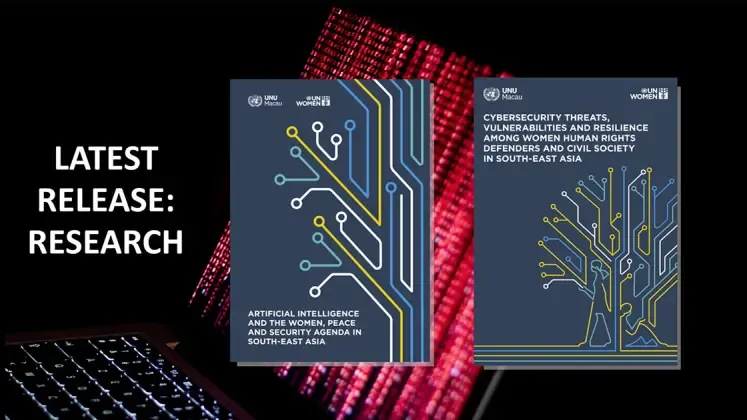Systemic issues can put women’s security at risk when artificial intelligence (AI) is adopted, and gender biases across widely used AI-systems pose a significant obstacle to the positive use of AI in the context of peace and security in South-East Asia.
Moreover, women human rights defenders (WHRDs) and women’s Civil Society Organisations (WCSOs) in the region are at high risk of experiencing cyber threats and, while largely aware of these risks, are not necessarily able to prepare for, or actively recover from, cyber-attacks.
These are among the key findings of groundbreaking research released today by UN Women and the United Nations University Institute in Macau (UNU Macau) examining the connections between AI, digital security and the women, peace and security (WPS) agenda in South-East Asia.
The research was made possible with support from the Government of Australia, under the Cyber and Critical Tech Cooperation Program (CCTCP) of the Department for Foreign Affairs and Trade (DFAT), and the Government of the Republic of Korea through the UN Women initiative, Women, Peace and Cybersecurity: Promoting Women, Peace and Security in the Digital World.
With AI projected to add USD 1 trillion to the gross domestic product of South-East Asian countries by 2030, understanding the impact of these technologies on the WPS agenda is critical to supporting these countries to regulate the technologies and mitigate their risks.
The report Artificial Intelligence and the Women, Peace and Security Agenda in South-East Asia, examines the opportunities and risks of AI from this unique perspective by focusing on four types of gender biases in AI – discrimination, stereotyping, exclusion, and insecurity – which need to be addressed before the region can fully benefit from new technological developments.
This research examines the relationship between AI and WPS according to three types of AI and its applications: AI for peace, neutral AI, and AI for conflict.
This report notes that across these categories, there are favourable and unfavourable effects of AI for gender-responsive peace and women’s agency in peace efforts.
While using AI for peace purposes can have multiple benefits, such as improving inclusivity and the effectiveness of conflict prevention and tracking evidence of human rights breaches, it is used unequally between genders, and pervasive gender biases render women less likely to benefit from the application of these technologies.
The report also highlights risks related to the use of these technologies for military purposes.
This research identifies two dimensions to improving the dynamics of AI and the WPS agenda in the region: mitigating the risks of AI systems to advancing the WPS agenda, especially on social media, but also on other tools, such as chatbots and mobile applications; and fostering the development of AI tools built explicitly to support gender-responsive peace in line with WPS commitments.
The second report, Cybersecurity Threats, Vulnerabilities and Resilience among Women Human Rights Defenders and Civil Society in South-East Asia, explores cybersecurity risks and vulnerabilities in this context with the goal of promoting cyber-resilience and the human and digital rights of women in all their diversity.
While there is increasing awareness of the risks women and girls face in cyberspace, there is little understanding of the impacts of gender on cybersecurity, or of the processes and practices used to protect digital systems and networks from cyber risks and their harms.
This work differs from previous research into cybersecurity as it focuses on human-centric as compared to techno-centric cybersecurity and emphasises human factors rather than technical skills as well as the centralisation of gender as critical to cybersecurity.
Furthermore, cyber threats are understood to be gendered in nature, whereby WCSOs and WHRDs are specifically targeted due to the focus of their work and are likely to be attacked with misogynistic and sexualised harassment.
The results highlight that digital technologies are central to the work of WCSOs and WHRDs, while simultaneously noting that WCSOs had higher threat perceptions and threat experiences compared to CSOs that do not work on gender and women’s rights, carrying disproportionate risks of disrupting their work, damaging their reputation, and even creating harm or injury, all of which contribute to marginalising women’s voices.
The largest differences of experienced threats between the groups were for online harassment, trolling (deliberately provoking others online to incite reactions) and doxxing (when private or identifying information is distributed about someone online without their permission).
This report’s recommendations include fostering inclusive and collaborative approaches in cybersecurity policy development and engagement, and building the knowledge of civil society, government, private-sector actors and other decision makers to develop appropriate means of prevention and response to cyberattacks and their disproportionate impacts on WCSOs and WHRDs.
Specific attention should be given to at-risk individuals and organizations, such as women’s groups operating in politically volatile and conflict and crisis-affected contexts and situations where civic space is shrinking.
The launch took place during a UN Women youth conference, Gen-Forum 2024: Young Leaders for Women, Peace and Security in Asia and the Pacific which commenced today in Bangkok, Thailand.
UNU Macau and UN Women aim for this research, conducted over 12 months, to contribute to the global discourse on ethics and norms surrounding AI and digital governance at large.
Next, training materials based on the research findings and consultations with women’s rights advocates in the region will be rolled out, initially in Thailand and Vietnam, with e-learning modules and training handbooks to be publicly available in English, Thai and Vietnamese for interested stakeholders from mid-2024.
Download full reports and research summaries
- Artificial Intelligence and the Women, Peace and Security Agenda in South-East Asia [Full Report] [Research Summary]
- Cybersecurity Threats, Vulnerabilities and Resilience among Women Human Rights Defenders and Civil Society in South-East Asia [Full Report] [Research Summary]
Media contacts
Qian Dai, UNU Macau dai@unu.edu
Julie Marks, UN Women gps.asiapacific@unwomen.org



